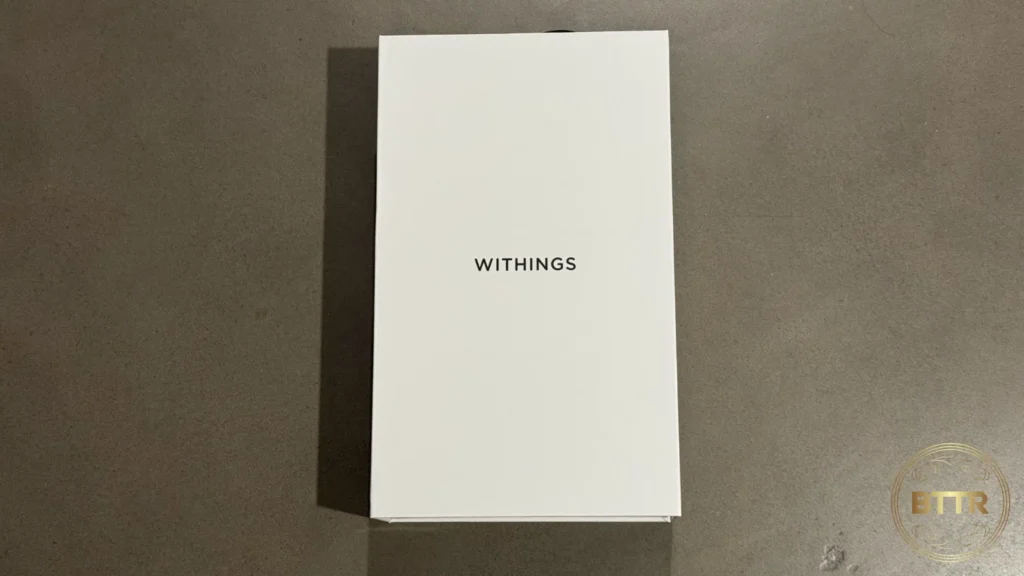BTTR is independent, but when you purchase through links on our site, we may earn a commission. Find out more.
Sleep: It’s the best part of my day. But it’s also easy to get into bad habits, or not give enough priority to. So the team at WIthings has created the Sleep Analyser, a mat that rests under your mattress to track your sleep.
I’ve been tracking my sleep using various wearables like the Apple Watch Series 9 and the Withings ScanWatch Light for years. But these devices are limited in the depth of information they offer.
So for the past month or so, I’ve been tracking my sleep with the Withings Sleep Analyser. It is completely effortless, and the insights are potentially useful, but it’s probably not something you would invest in if you don’t experience any sleep problems.

Design
The Withings Sleep Analyser is not a complicated device. It is a sheet of grey fabric with a power cord attached and sensors inside.
The fabric measures in at about 637 × 190 × 5 mm. Installation is as simple as laying the analyser out under the mattress where your chest will rest while you sleep.
Because it rests underneath your mattress, those with slat beds may need to pop a sheet of cardboard underneath the mattress as well to ensure it rests securely. But that’s the only real complication — the Sleep Analyser is designed to work with any type of bed.
Inside the fabric are several sensors. It has Wi-Fi and Bluetooth connectivity, but the core functionality comes from a pneumatic sensor and a sound sensor.
The pneumatic sensor measures respiratory rate, heart beats and body movements, while the sound sensor will track snoring and “cessations of breathing episodes”.
What does that mean? It means that the Sleep Analyser can help detect sleep apnea in a non-invasive way, in addition to traditional sleep cycle tracking.

Performance
Because the device itself is so straightforward, it actually comes down to the Withings app to do the heavy lifting.
The app is the same as the one you would use with any other Withings gear, like a smartwatch or one of their body scales. But after pairing the sleep analyser, you will get more profound insights into your slumber.
At the core of the experience is the combination of sleep cycle and sleep score. Anyone who has used a WIthings smartwatch will recognise the metrics here, as they are mostly the same.
You’ll get a breakdown of your sleep duration, depth, regularity, and the number of interruptions through the night.
Withings combines these into a sleep score, which gives you a regular record of how well rested you are, as well as a few tips on how to improve.
The Sleep Analyser does introduce a couple of additional metrics: “Time to sleep” and “Time to get up”. This does what it says on the tin – It will detect how long it takes you to fall asleep from when you crawl into bed, and how quickly you get out of bed.
On particularly lazy Sundays, I have seen it track that I have fallen back asleep when instead I was scrolling on my phone. But it’s mostly accurate.
Heart rate, snoring and sleep apnea
Except for those last two details, everything I’ve mentioned so far is a measurement you can get from a wrist-based tracker.
Similarly, certain wearables will track your sleeping heart rate, so the Sleep analyser’s performance here isn’t overly revolutionary.
It is interesting, though, to be able to track your sleeping. Heart rate and see it spike quite dramatically during illness.
However, what makes the Sleep Analyser most useful for people trying to determine sleep issues is its ability to record snoring and sleep apnea.
The Sleep Analyser was developed in collaboration with sleep physicians from Hôpital Béclère in Paris, and extensively tested against data obtained by polysomnography (PSG) analysis.
This means that it can deliver medical-grade sleep apnea detection, without any need to undergo invasive studies.
From my perspective, I never had any concerns about sleep apnea, so it’s nice to see the results come back that my apnea reading is in the normal to mild range.
But if it was something I was concerned with, then the Sleep Analyser would be a relatively cost-effective way of discovering it. While $199 isn’t cheap for something just for the hell of it, compared to the medical costs of doing a proper sleep study, it’s a good place to start.
While I’ve not really had any concerns about apnea, my wife has a history of complaining about my snoring. And on this front, she would argue the sleep analyser underperforms.
After one particular night, my wife loudly complained I’d kept her awake, the analyser claimed I’d only snored for about 3 minutes.
I can’t really argue whether my wife or the gadget is in the right here. But the real question is — once you have this information, what do you do with it?
The Withings app
One of the strengths of the Withings app is that all your data can be easily exported to a report you can share with your doctor.
So if you are having sleeping problems, you can pick up the Sleep analyser, record data for a few weeks or months, and then share a sleep report with a medical professional.
Interestingly, for some reason my export had data missing in the total sleep time graph. All that info is in the app, so I’m not sure if it was a computing error or something else.

Verdict
For most people, the Withings Sleep Analyser doesn’t make sense. A solid proportion of the information it gets can be obtained from a smartwatch just as easily, with the benefit of also tracking fitness goals.
But let’s be honest, unless you are having sleep issues, you’re unlikely to consider something like this. And if you are having sleep difficulties, then this is a great first step to understanding them, and potentially much more cost-effective than a full sleep study.
That said, you may still need to undergo a full sleep study. This isn’t a replacement for medical advice. It can, however, help your doctor make a more informed decision.
And when combined with other information from the Withings Health ecosystem, can help to paint a much more complete portrait of your overall wellbeing.
Buy the Withings Sleep Analyser online
Withings supplied the product for this review.






